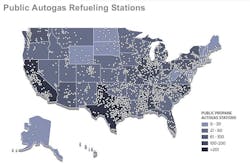With more fleets considering alternative fuels to move their vehicles, there are lots of questions transit leaders may have in terms of what kind of options they should consider.
Two popular alternative fuels in transit are propane autogas and compressed natural gas. While both fuels have many cost saving advantages versus traditional diesel engines and also harbor environmental benefits, the installation of the fuel sources entails some very different approaches.
Tucker Perkins of the Propane Education & Research Council, said both propane and natural gas are great options for domestic fuel choices, but propane has a much less expensive investment cost in setting up infrastructure.
“I think a big reason you choose it is the cost benefit to your business,” he said during a Feb. 26 webinar.
Perkins said a major advantage to the propane autogas is the permitting process is simple in most cases because propane tanks can be placed either above ground or in ground and it’s pumped in liquid form so it only requires a 5 horsepower pump to move the fuel. Most of the issues at hand with getting through the permitting process are local zoning issues.
And while CNG maintenance facilities require special considerations for working on vehicles, Perkins said propane autogas in most cases doesn’t need any special facility upgrades.
Because of the cost savings, he said 10 propane autogas pumps can be installed for the cost of one CNG pump, with the typical cost of a fueling station for propane between $30,000 and $70,000.
“When we talk about natural gas, we feel that propane is not the only solution,” Perkins said.
Mark Baron, vice president with Trillium CNG, said while there are some more issues that go along with initial CNG infrastructure costs, it’s delivered to stations via pipeline so there isn’t an issue with supply for a fleet. It because of the cost advantages to natural gas, the proper infrastructure will allow for an agency to get costs to pump fuel for about 10 cents per gallon.
He also stressed there are many tax credit and other cost savings opportunities available to make CNG an attractive option.
Propane and natural gas have both seen price spikes due to shortages brought on by bitterly cold temperatures in the upper Midwest, but both said changes in prices are common for all fuel types. Perkins said one of the unique challenges propane has is the demand level is too low for propane while there’s a lot of supply.
Alternative fuels will continue to grow in popularity for transit agencies in North America as transit agencies look to reduce costs and lessen their environmental impact, which is increasingly an important issue for their customers. As they make their decisions on which way they want to proceed in fueling their fleets, there are plenty of options and lots to consider when deciding which route you want to take to fuel your fleet.
About the Author
Joe Petrie
Associate Editor
I came to Mass Transit in 2013 after spending seven years on the daily newsbeat in southeastern Wisconsin.
Based in Milwaukee, I worked as a daily newspaper reporter with the Waukesha Freeman from 2006-2011, where I covered education, county and state government. I went on to cover courts for Patch.com, where I was the main courts reporter in the Metro Milwaukee cluster of websites.
I’ve won multiple awards during the course of my career and have covered some of the biggest political events in the past decade and have appeared on national programs.
Having covered local government and social issues, I discovered the importance of transit and the impact it can have on communities when implemented, supported and funded.

